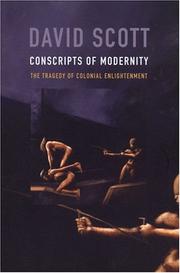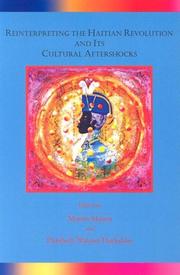| Listing 1 - 10 of 10 |
Sort by
|
Book
ISBN: 1469607891 1469607883 9781469607887 1469607875 9781469607870 9781469607870 1469607875 9798890846327 Year: 2012 Publisher: Chapel Hill University of North Carolina Press
Abstract | Keywords | Export | Availability | Bookmark
 Loading...
Loading...Choose an application
- Reference Manager
- EndNote
- RefWorks (Direct export to RefWorks)
Toussaint L'Ouverture (1743-1803) won international renown in the Haitian fight for independence. He led thousands of former slaves into battle against French, Spanish, and English forces, routing the Europeans and seizing control of the entire island of Hispaniola. L'Ouverture became governor and commander-in-chief of Haiti before officially acknowledging French rule in 1801, when he submitted a newly written constitution to Napoleon Bonaparte (1769-1821) and the French legislature for ratification. In response, Bonaparte sent an army to depose L'Ouverture, who was taken prisoner in June of 1
Generals --- Revolutionaries --- Toussaint Louverture, --- Haiti --- History --- Toussaint-Bréda, Pierre Dominique, --- Bréda, Pierre Dominique Toussaint-, --- Toussaint, François Dominique, --- Toussaint, Pierre Dominique, --- Louverture, Toussaint, --- Ouverture, Toussaint L', --- Ṭusain Luverṭir, --- Toussaint Louverture, Pierre Dominique, --- Toussaint L'Ouverture, François-Dominique, --- L'Overture, Toussaint, --- טוסיין לוברטיר, --- Tousen Breda, Franswa Dominik, --- Breda, Franswa Dominik Tousen, --- Lauverture, --- Louverture,
Book
ISBN: 0199393524 0190254580 0199937230 0199937222 1306315891 9780199937233 9780199937226 Year: 2014 Publisher: Oxford, [England] ; New York, [New York] : Oxford University Press,
Abstract | Keywords | Export | Availability | Bookmark
 Loading...
Loading...Choose an application
- Reference Manager
- EndNote
- RefWorks (Direct export to RefWorks)
Here is an annotated, scholarly, multilingual edition of the only lengthy text personally written by Haitian revolutionary Toussaint Louverture: the memoirs he wrote shortly before his death in the French prison of Fort de Joux. The translation is based on an original copy in Louverture's hand never before published. Historian Philippe Girard begins with an introductory essay that retraces Louverture's career as a slave, rebel, and governor. Girard provides a detailed narrative of the last year of Louverture's life, and analyzes the significance of the memoirs and letters from a historical and
Generals --- Revolutionaries --- Toussaint Louverture, --- Haiti --- History --- Toussaint-Bréda, Pierre Dominique, --- Bréda, Pierre Dominique Toussaint-, --- Toussaint, François Dominique, --- Toussaint, Pierre Dominique, --- Louverture, Toussaint, --- Ouverture, Toussaint L', --- Ṭusain Luverṭir, --- Toussaint Louverture, Pierre Dominique, --- Toussaint L'Ouverture, François-Dominique, --- L'Overture, Toussaint, --- טוסיין לוברטיר, --- Tousen Breda, Franswa Dominik, --- Breda, Franswa Dominik Tousen, --- Lauverture, --- Louverture,
Book
ISBN: 9781786800282 1786800284 9781786800299 1786800292 9780745335155 0745335152 9781786800305 1786800306 0745335144 Year: 2017 Publisher: Pluto Press
Abstract | Keywords | Export | Availability | Bookmark
 Loading...
Loading...Choose an application
- Reference Manager
- EndNote
- RefWorks (Direct export to RefWorks)
Toussaint Louverture (c1743-1803) was the heroic leading figure in the Haitian Revolution of 1791-1804, the only successful slave revolt in recorded history, and he remains an international inspiration, seen by many to be one of the greatest anti-imperialist fighters who ever lived. Toussaint was a military genius who led an army composed overwhelmingly of former enslaved Africans and people of African descent to victory after victory under the banner Liberty or Death over the professional armies of France, Spain and Britain, before paying the ultimate price himself for refusing to compromise with imperial power at the expense of the maintenance of liberty for all. This new political biography of Toussaint aims to provide readers with an accessible yet scholarly introduction to his complex life while critically analysing Toussaint's political thought, his contribution as a revolutionary leader, and his legacy for both Haiti and the wider world.
Generals --- Toussaint Louverture, --- Toussaint-Bréda, Pierre Dominique, --- Bréda, Pierre Dominique Toussaint-, --- Toussaint, François Dominique, --- Toussaint, Pierre Dominique, --- Louverture, Toussaint, --- Ouverture, Toussaint L', --- Ṭusain Luverṭir, --- Toussaint Louverture, Pierre Dominique, --- Toussaint L'Ouverture, François-Dominique, --- L'Overture, Toussaint, --- טוסיין לוברטיר, --- Tousen Breda, Franswa Dominik, --- Breda, Franswa Dominik Tousen, --- Lauverture, --- Louverture, --- History --- Toussaint Louverture --- Haiti --- Slavery --- biography --- Haitian Revolution --- France --- Saint-Domingue

ISBN: 0822334445 082233433X 9780822334446 Year: 2004 Publisher: Durham, N.C. Duke University Press
Abstract | Keywords | Export | Availability | Bookmark
 Loading...
Loading...Choose an application
- Reference Manager
- EndNote
- RefWorks (Direct export to RefWorks)
Fiction --- English literature --- History of civilization --- anno 1900-1999 --- Historiography. --- History --- Literature and history. --- Postcolonialism --- Periodization. --- Philosophy. --- History. --- James, C. L. R. --- Toussaint Louverture, --- James, C. L. R., --- Historiography --- Literature and history --- Post-colonialism --- Postcolonial theory --- Political science --- Decolonization --- History and literature --- History and poetry --- Poetry and history --- History, Modern --- Periodization in history --- Historical criticism --- Authorship --- Periodization --- Philosophy --- Methodology --- Criticism --- Toussaint-Bréda, Pierre Dominique, --- Bréda, Pierre Dominique Toussaint-, --- Toussaint, François Dominique, --- Toussaint, Pierre Dominique, --- Louverture, Toussaint, --- Ouverture, Toussaint L', --- Ṭusain Luverṭir, --- Toussaint Louverture, Pierre Dominique, --- Toussaint L'Ouverture, François-Dominique, --- L'Overture, Toussaint, --- טוסיין לוברטיר, --- Tousen Breda, Franswa Dominik, --- Breda, Franswa Dominik Tousen, --- Lauverture, --- Louverture,

ISBN: 9029536179 Year: 1991 Publisher: Amsterdam Uitgeverij De Arbeiderspers
Abstract | Keywords | Export | Availability | Bookmark
 Loading...
Loading...Choose an application
- Reference Manager
- EndNote
- RefWorks (Direct export to RefWorks)
History of France --- Toussaint Louverture --- anno 1800-1899 --- Haiti --- Slaves --- 815 Geschiedenis --- 821.5 Mensenrechten --- 834 Arbeid --- 841.1 Democratisering --- 841 Politiek Bestel --- 844.6 Samenlevingsproblemen --- 844 Sociale Structuur --- 858.1 Politiek geweld --- 884.4 West-Europa --- Enslaved persons --- Persons --- Slavery --- Emancipation --- Toussaint Louverture, --- Toussaint-Bréda, Pierre Dominique, --- Bréda, Pierre Dominique Toussaint-, --- Toussaint, François Dominique, --- Toussaint, Pierre Dominique, --- Louverture, Toussaint, --- Ouverture, Toussaint L', --- Ṭusain Luverṭir, --- Toussaint Louverture, Pierre Dominique, --- Toussaint L'Ouverture, François-Dominique, --- L'Overture, Toussaint, --- טוסיין לוברטיר, --- Tousen Breda, Franswa Dominik, --- Breda, Franswa Dominik Tousen, --- Lauverture, --- Louverture, --- History
Book
ISBN: 0253008107 9780253008107 1299466842 9781299466845 9780253006271 0253006279 9780253006301 0253006309 Year: 2013 Publisher: Bloomington
Abstract | Keywords | Export | Availability | Bookmark
 Loading...
Loading...Choose an application
- Reference Manager
- EndNote
- RefWorks (Direct export to RefWorks)
In Free and French in the Caribbean, John Walsh studies the writings of Toussaint Louverture and Aimé Césaire to examine how they conceived of and narrated two defining events in the decolonializing of the French Caribbean: the revolution that freed the French colony of Saint-Domingue in 1803 and the departmentalization of Martinique and other French colonies in 1946. Walsh emphasizes the connections between these events and the distinct legacies of emancipation that emerged through the narratives of revolution and nationhood passed on to successive generations. Part one concerns Toussaint'
Nationalism in literature. --- Decolonization in literature. --- Nationalism --- Martinican literature (French) --- French literature --- Martinique literature (French) --- Consciousness, National --- Identity, National --- National consciousness --- National identity --- International relations --- Patriotism --- Political science --- Autonomy and independence movements --- Internationalism --- Political messianism --- History. --- History and criticism. --- Cesaire, Aime. --- Toussaint Louverture, --- Toussaint-Bréda, Pierre Dominique, --- Bréda, Pierre Dominique Toussaint-, --- Toussaint, François Dominique, --- Toussaint, Pierre Dominique, --- Louverture, Toussaint, --- Ouverture, Toussaint L', --- Ṭusain Luverṭir, --- Toussaint Louverture, Pierre Dominique, --- Toussaint L'Ouverture, François-Dominique, --- L'Overture, Toussaint, --- טוסיין לוברטיר, --- Tousen Breda, Franswa Dominik, --- Breda, Franswa Dominik Tousen, --- Lauverture, --- Louverture, --- Césaire, Aimé --- Césaire, A. --- Caribbean, French-speaking --- Haiti --- French-speaking Caribbean --- History --- Autonomy and independence movements.


ISBN: 1435630955 9781435630956 976640190X 9789766401900 Year: 2006 Publisher: Kingston University of the West Indies Press
Abstract | Keywords | Export | Availability | Bookmark
 Loading...
Loading...Choose an application
- Reference Manager
- EndNote
- RefWorks (Direct export to RefWorks)
Haitian literature --- Nationalism --- Latin America --- Regions & Countries - Americas --- History & Archaeology --- Consciousness, National --- Identity, National --- National consciousness --- National identity --- International relations --- Patriotism --- Political science --- Autonomy and independence movements --- Internationalism --- Political messianism --- French literature --- Haitian literature (French) --- History and criticism --- Haitian authors --- History of Latin America --- revolutions --- anno 1700-1799 --- anno 1800-1899 --- Haiti --- Toussaint Louverture, --- History --- Influence. --- Civilization. --- Politics and government. --- Haitian revolution --- Cultural aftershocks --- Toussaint-Bréda, Pierre Dominique, --- Bréda, Pierre Dominique Toussaint-, --- Toussaint, François Dominique, --- Toussaint, Pierre Dominique, --- Louverture, Toussaint, --- Ouverture, Toussaint L', --- Ṭusain Luverṭir, --- Toussaint Louverture, Pierre Dominique, --- Toussaint L'Ouverture, François-Dominique, --- L'Overture, Toussaint, --- טוסיין לוברטיר, --- Tousen Breda, Franswa Dominik, --- Breda, Franswa Dominik Tousen, --- Lauverture, --- Louverture, --- Ayiti --- Bohio --- Haichi --- Hayti --- Haytian Republic --- Quisqueya --- Repiblik Ayiti --- Repiblik d Ayiti --- Republic of Haiti --- République d'Haïti --- ハイチ --- هايتي --- Гаити --- Gaiti --- Saint-Domingue
Book
ISBN: 1781386196 1846316510 9781846316517 9781781386194 9781846314971 1846314976 1846317606 Year: 2011 Publisher: Liverpool Liverpool University Press
Abstract | Keywords | Export | Availability | Bookmark
 Loading...
Loading...Choose an application
- Reference Manager
- EndNote
- RefWorks (Direct export to RefWorks)
The Haitian Revolution has generated responses from commentators in fields ranging from philosophy to historiography to twentieth-century literary and artistic studies. But what about the written work produced at the time, by Haitians? This book is the first to present an account of a specifically Haitian literary tradition in the Revolutionary era. Beyond the Slave Narrative shows the emergence of two strands of textual innovation, both evolving from the new revolutionary consciousness: the remarkable political texts produced by Haitian revolutionary leaders Toussaint Louverture and Jean-Jacques Dessalines, and popular Creole poetry from anonymous courtesans in Saint-Domingue's libertine culture. These textual forms, though they differ from each other, both demonstrate the increasing cultural autonomy and literary voice of non-white populations in the colony at the time of revolution. Unschooled generals and courtesans, long presented as voiceless, are at last revealed to be legitimate speakers and authors.These Haitian French and Creole texts have been neglected as a foundation of Afro-diasporic literature by former slaves in the Atlantic world for two reasons: because they do not fit the generic criteria of the slave narrative (which is rooted in the autobiographical experience of enslavement); and because they are mediated texts, relayed to the print-cultural Atlantic domain not by the speakers themselves, but by secretaries or refugee colonists. These texts challenge how we think about authorial voice, writing, print culture, and cultural autonomy in the context of the formerly enslaved, and demand that we reassess our historical understanding of the Haitian Independence and its relationship to an international world of contemporary readers.
Haitian poetry (French Creole) --- Creole poetry, Haitian French --- French Creole poetry, Haitian --- Haitian French Creole poetry --- Haitian literature (French Creole) --- History and criticism. --- Dessalines, Jean-Jacques, --- Toussaint Louverture, --- Toussaint-Bréda, Pierre Dominique, --- Bréda, Pierre Dominique Toussaint-, --- Toussaint, François Dominique, --- Toussaint, Pierre Dominique, --- Louverture, Toussaint, --- Ouverture, Toussaint L', --- Ṭusain Luverṭir, --- Toussaint Louverture, Pierre Dominique, --- Toussaint L'Ouverture, François-Dominique, --- L'Overture, Toussaint, --- טוסיין לוברטיר, --- Tousen Breda, Franswa Dominik, --- Breda, Franswa Dominik Tousen, --- Lauverture, --- Louverture, --- Jacques --- Haiti --- Ayiti --- Bohio --- Haichi --- Hayti --- Haytian Republic --- Quisqueya --- Repiblik Ayiti --- Repiblik d Ayiti --- Republic of Haiti --- République d'Haïti --- ハイチ --- هايتي --- Гаити --- Gaiti --- Saint-Domingue --- History --- Literature and the revolution. --- Politics and government --- Slavery in literature. --- Slavery and slaves in literature --- Slaves in literature --- Creole literature, Haitian French --- French Creole literature, Haitian --- Haitian French Creole literature --- Enslaved persons in literature
Book
ISBN: 9780817317324 9780817385408 0817385401 0817317325 Year: 2011 Publisher: Tuscaloosa, Ala University of Alabama Press
Abstract | Keywords | Export | Availability | Bookmark
 Loading...
Loading...Choose an application
- Reference Manager
- EndNote
- RefWorks (Direct export to RefWorks)
To a contemporary audience, Haiti brings to mind Voodoo spells, Tontons Macoutes, and boat people--nothing worth fighting over. Two centuries ago, however, Haiti, then known as Saint-Domingue, was the "Pearl of the Antilles," France's most valuable overseas colony, the largest exporter of tropical products in the world, and the United States' second most important trading partner after England. Haiti was also the place where in 1801-1802 Napoléon Bonaparte sent the largest colonial venture of his reign: the Leclerc expedition. His goal was to remove the famo
Toussaint Louverture --- Napoleon I Bonaparte [Emperor of the French] --- Haiti --- Statesmen --- Revolutionaries --- Generals --- Public officers --- Napoleon --- Toussaint Louverture, --- Bonapart, Napoleon, --- Bonāpārṭa, Nepoliyana, --- Bonaparte, Napoleão, --- Bonaparte, Napoleon, --- Bonaparte, Napoleone, --- Bonaparṭeh, Napolyon, --- Buonaparte, Napoleon, --- Na-pʻo-lun, --- Nābuliyūn, --- Napoleone --- Napʻolleong, --- Napolun, --- נפוליאון --- נפוליאון, --- نابليون --- بونابرت، نابليون، --- Būnābart, Nābuliyūn, --- Toussaint-Bréda, Pierre Dominique, --- Bréda, Pierre Dominique Toussaint-, --- Toussaint, François Dominique, --- Toussaint, Pierre Dominique, --- Louverture, Toussaint, --- Ouverture, Toussaint L', --- Ṭusain Luverṭir, --- Toussaint Louverture, Pierre Dominique, --- Toussaint L'Ouverture, François-Dominique, --- L'Overture, Toussaint, --- טוסיין לוברטיר, --- Tousen Breda, Franswa Dominik, --- Breda, Franswa Dominik Tousen, --- Lauverture, --- Louverture, --- Ayiti --- Bohio --- Haichi --- Hayti --- Haytian Republic --- Quisqueya --- Repiblik Ayiti --- Repiblik d Ayiti --- Republic of Haiti --- République d'Haïti --- ハイチ --- هايتي --- Гаити --- Gaiti --- Saint-Domingue --- History --- Napoléon --- Bonaparte, Napoléon --- Bonāpārṭa, Nepoliyana --- Bonaparte, Napoleão --- Bonaparte, Napoleon --- Bonaparte, Napoleone --- Buonaparte, Napoleon --- Na-pʻo-lun --- Napolun
Book
ISBN: 0820346322 9780820346328 1306117623 9781306117623 9780820342122 0820342122 9780820342139 0820342130 9780820347691 0820347698 9780820345369 0820345369 9780820345994 0820345997 1299954774 Year: 2014 Publisher: Athens London
Abstract | Keywords | Export | Availability | Bookmark
 Loading...
Loading...Choose an application
- Reference Manager
- EndNote
- RefWorks (Direct export to RefWorks)
"We're seeing people that we didn't know exist," the director of FEMA acknowledged in the wake of Hurricane Katrina. Sacral Grooves, Limbo Gateways offers a corrective to some of America's institutionalized invisibilities by delving into the submerged networks of ritual performance, writing, intercultural history, and migration that have linked the coastal U.S. South with the Caribbean and the wider Atlantic world. This interdisciplinary study slips beneath the bar of rigid national and literary periods, embarking upon deeper--more rhythmic and embodied--signatures of time. It swings low through ecologies and symbolic orders of creolized space. And it reappraises pluralistic modes of knowledge, kinship, and authority that have sustained vital forms of agency (such as jazz) amid abysses of racialized trauma. Drawing from Haitian Vodou and New Orleanian Voudou and from Cuban and South Floridian Santería, as well as from Afro-Baptist (Caribbean, Geechee, and Bahamian) models of encounters with otherness, this book repalces deep-southern texts within the counter clockwise ring-stepping of a long Afro-Atlantic modernity. Turning to an orphan girl's West African initiation tale to follow a remarkably travelled body of feminine rites and writing (in works by Paule Marshall, Zora Neale Hurston, Lydia Cabrera, William Faulkner, James Weldon Johnson, and LeAnne Howe, among others), Cartwright argues that only in holistic form, emergent from gulfs of cross-cultural witness, can literary and humanistic authority find legitimacy. Without such grounding, he contends, our educational institutions blind and even poison students, bringing them to "swallow lye," like the grandson of Phoenix Jackson in Eudora Welty's "A Worn Path." Here, literary study may open pathways to alternative medicines--fetched by tenacious avatars like Phoenix (or an orphan Kumba or a shell-shaking Turtle)--to remedy the lies our partial histories have made us swallow.
HISTORY / Revolutionary. --- HISTORY / Caribbean & West Indies / General. --- HISTORY / United States / Colonial Period (1600-1775). --- Blacks --- Negroes --- Ethnology --- Race identity --- Toussaint Louverture, --- Adams, John, --- Atlantic Ocean Region --- Haiti --- United States --- Atlantic Area --- Atlantic Region --- Ayiti --- Bohio --- Haichi --- Hayti --- Haytian Republic --- Quisqueya --- Repiblik Ayiti --- Repiblik d Ayiti --- Republic of Haiti --- République d'Haïti --- ハイチ --- هايتي --- Гаити --- Gaiti --- Saint-Domingue --- Race relations --- History --- Influence. --- Foreign relations --- Caribbean literature (English) --- American literature --- Authority --- Space and time --- Creoles --- African Americans --- Political science --- Authoritarianism --- Consensus (Social sciences) --- Space of more than three dimensions --- Space-time --- Space-time continuum --- Space-times --- Spacetime --- Time and space --- Fourth dimension --- Infinite --- Metaphysics --- Philosophy --- Space sciences --- Time --- Beginning --- Hyperspace --- Relativity (Physics) --- Racially mixed people --- Afro-Americans --- Black Americans --- Colored people (United States) --- Africans --- History and criticism. --- Social aspects. --- Social life and customs. --- Caribbean Area --- Southern States --- Toussaint-Bréda, Pierre Dominique, --- Bréda, Pierre Dominique Toussaint-, --- Toussaint, François Dominique, --- Toussaint, Pierre Dominique, --- Louverture, Toussaint, --- Ouverture, Toussaint L', --- Ṭusain Luverṭir, --- Toussaint Louverture, Pierre Dominique, --- Toussaint L'Ouverture, François-Dominique, --- L'Overture, Toussaint, --- טוסיין לוברטיר, --- Tousen Breda, Franswa Dominik, --- Breda, Franswa Dominik Tousen, --- Lauverture, --- Louverture, --- Novanglus, --- Black persons --- Black people
| Listing 1 - 10 of 10 |
Sort by
|

 Search
Search Feedback
Feedback About UniCat
About UniCat  Help
Help News
News